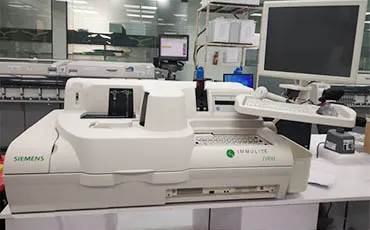REPRODUCTIVE GENETICS
Obstetricians have been the first user of genetic tests. Ranging from birth defects, testing of still birth, IUFD, and small for dates babies. Genetic testing can help understand cause of abortion, infertility, and other gynaecological conditions.
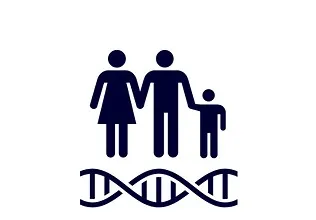
Infertility
Approximately 10-15% of couples experience infertility. Infertility is mostly defined as a condition when an individual is not able to bare a child even after a year of frequent unprotected intercourse. A genetic evaluation (counselling and testing) plays a role in improving the reproductive outcomes of infertile couples.
Carrier Testing
Carrier testing is performed to determine whether a person carries one copy of an altered gene for a particular disease. The disease may be autosomal recessive, which means that the disease is present in an individual only if two copies of the altered gene are inherited from their parents or family. Couples who both carry the same autosomal recessive gene have 25 percent chance with each pregnancy to have a child with that disease.
ONCOLOGY
One of the most important outcome of cancer genomics is early detection of any cancer using advanced technologies such as NGS (Next Generation Sequencing). Once the cancer is detected or predicted, an individual can start early treatment and thrive to acquire a healthy lifestyle which helps combat the progress of cancer at terminal stage. Thus, the main goal of cancer genomics is mainly to improve the chances of survival and quality of life.
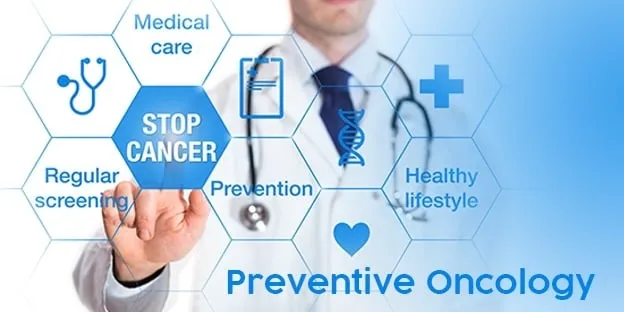
One of the most important outcome of cancer genomics is early detection of any cancer using advanced technologies such as NGS (Next Generation Sequencing). Once the cancer is detected or predicted, an individual can start early treatment and thrive to acquire a healthy lifestyle which helps combat the progress of cancer at terminal stage. Thus, the main goal of cancer genomics is mainly to improve the chances of survival and quality of life. For cancer testing we accept all sample types including fresh tissue, FFPE, bone marrow, as well as liquid biopsy for circulating cancer cells.
PHARMACOGENOMICS
Pharmacogenomics, also called Pharmacogenetics, is the study of how our genes basically affect the way we respond to the drugs. Depending on the genetic composition of an individual, some drugs can be useful for him/her while the same drug may not at all work for another person. This interaction of drug depends mainly on how you take your drug and also where it acts in your body. The individual’s DNA can be affected in multiple steps during the whole process of drug intake. Adverse drug reactions can cause hospitalization and deaths.
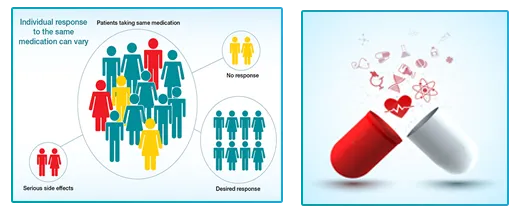
Here a person’s genetic information is used to predict how well they will respond to a drug and whether they are likely to get any side effects from the drug and its dosage that also contributes in drug development target apart from treating just symptoms.
The field of pharmacogenetics is rapidly growing and in future can contribute to better effective drugs to treat a wide range of conditions such as, cardiovascular disease, Alzheimer disease, cancer, diabetes, etc
CONSUMER GENETICS
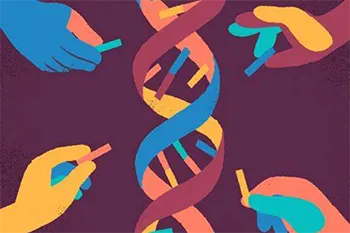
Consumer genomics, encompassing both direct-to-consumer applications (i.e., genetic testing that is accessed by a consumer directly from a commercial company apart from a health care provider) and consumer-driven genetic testing (i.e., genetic testing ordered by a health care provider in response to an informed patient request), has evolved considerably over the past decade, moving from more personal utility-focused applications outside of traditional health care to interfacing with clinical care in nontraditional ways. As consumer genomics has increasingly intersected with clinical applications, discussions have arisen around the need to demonstrate clinical and analytical validity and clinical utility due to the potential for misinterpretation by consumers.
Clinical readiness and interest for this information have presented educational and training challenges for providers. At the same time, consumer genomics has emerged as a potentially innovative mechanism for thinking about health literacy and engaging participants in their health and health care.
Fluorescence In situ hybridization (FISH)
Our Predictive Analytics support population health management, financial success, and better outcomes across the value-based care continuum. It estimates the likelihood of a future outcome based on patterns in the historical data.
This allows clinicians, financial experts, and administrative staff to receive alerts about potential events before they happen, and therefore make more informed choices about how to proceed with a decision.
We believe that being one step ahead of events is most clearly seen in the realms of intensive care, surgery, or emergency care, where a patient’s life might depend on a quick reaction time and a finely-tuned sense of when something is going wrong.
.webp)
Next Generation Sequencing (NGS)
Our programs for corporates are a comprehensive health initiatives and are designed to maintain and improve the well-being of the population through a proper diet, health screening, exercise, stress management, and illness prevention.
Workplace programs not only fight the upward trend of unhealthy employees, but also decrease medical care costs and insurance premium expenses incurred. It increases the motivation to improved health.
.webp)
Pathology diagnostic services for B2B & B2C customers
Pathology Diagnostic identifies the cause of disease based on clinical pathology and/or morphologic findings, It also studied on basis of history, ancillary test results and clinical signs. It is important in all areas of pathology, both in spontaneous and in experimentally-induced disease.
In experimental studies, it is important to separate out the effects of spontaneous disease and those induced by the experimental agent/test article. Diagnostic pathology is essential to investigate unexpected disease or death in laboratory animal colonies or prior to the termination of a study.
